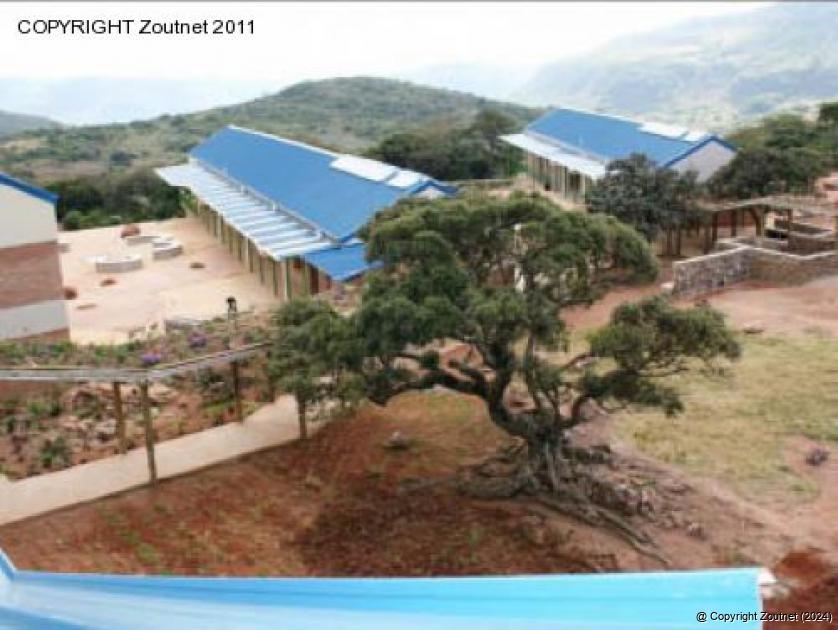
Vele School with some of its ‘green roofs’ seen from the admin tower. The ‘teaching tree’ (the first school) has been preserved in the centre. Photo supplied.
News - Date: 15 July 2011
Oprah Winfrey’s “new Limpopo school” is the talk of green architecs and educationalists all over the country.
Nestled deep in the rugged folds of the Soutpansberg in the small village of Gogogo, four learners of the Vele Secondary School recently visited Madi a Thavha Mountain Lodge west of Louis Trichardt to learn how to become junior tour guides for their school. The school was practically rebuilt with the help of the Oprah Foundation and is scheduled to open officially by the end of this year.
“Our principal, Mr Samuel Makhado, has been kept so busy being a tour guide to an increasing stream of visitors who want to see our ‘green roofs’ that he jumped at the opportunity when Marcelle Bosch of Madi a Thavha offered to train us to do the job,” says the excited Blessing Ndou, a Grade 10 student at Vele.
“Although the Oprah Foundation donated money towards certain facilities, it is not Oprah-owned but a normal public school with an eco-efficient and learner-centric school design,” Makhado explained.
The architects, Steve Kinsler and Derek van Heerden of East Coast Architects, have an integrative approach to designing spaces for the education and health-care sectors. The main characteristics are efficient use of energy, waste and water in combination with special care given to social relevance. They have a shared distaste for flashy consumerism and architecture inappropriate for the social and natural environment, a trend which Van Heerden calls “porno graphic” architecture.
Design features of Vele include a rainwater-harvesting installation with a total storage capacity of 150,000 litres and 50m² of solar panels which will provide electricity to 80 computers. Passive and low-energy design also create naturally lit and ventilated classrooms that are warm in winter and cool in summer.
“I used to fall asleep during most of our classes at the ‘old’ school,” says Grade 11 learner Konanani Matamela, who wants to become a TV presenter one day. “Now the classes are cool in summer and I’ll be studying or reading books in the classroom instead of wasting my time idling outside under a tree.”
“I was one of those who bunked class regularly in winter,” Blessing admits. “Now I’m the first at school. You’d swear they had lit heaters during the evening in my classroom”.
“The new school has wonderful facilities and equipment and we don’t have to pay money to go to other labs far away to perform experiments. It has changed my life. I am now working harder than before and believe there is hope for me to become a dentist. I was also one of the lucky pupils who received a bicycle to come to school with”, says Tshilidzi Khakhu.
The layout of the school grounds was designed to facilitate shared use of school facilities by local communities and surrounding schools. Food gardens were developed to supplement the school´s nutrition programme. Design and construction features are now being integrated into the school curriculum. For example, the plants and seeds for the green roofs were sourced by the learners themselves and now serve as insulation and a wildlife habitat for students to study.
“Academic performance of the whole school has improved since we have moved into the new school,” says Grade 9 pupil Thendo Mushaya. The learners love their principal and say that he has always been strict yet supportive. While they all felt that some teachers seem to be more disciplined and committed to make the new school work, they clearly realise that it will require effort and commitment from all the teachers, learners and the whole community to eventually be the model that is envisioned for the school.
“Here at Madi a Thavha, we have for instance learned much more about our own culture and heritage than we ever knew,” says Blessing. “They took us on a guest tour to Venda and Tsonga artists and crafters around Elim. The lodge itself is also busy with the construction of a gallery and cultural heritage resource centre that covers a confluence of the history and heritage of all the peoples who lived and are still living in this beautiful yet unknown and unspoilt northern part of our country. We are proud to be Venda and proud to be descendants of the pioneers of Limpopo!”
The cultural, heritage and resource centre at Madi a Thavha will be finished and open for the public and organised tours by the end of August this year. For more information on the centre, phone Marcelle at 083 342 4162. (This article was compiled by Vele learners, in cooperation with Elthea Schlesinger, who taught them writing skills as part of their tour guide training).








